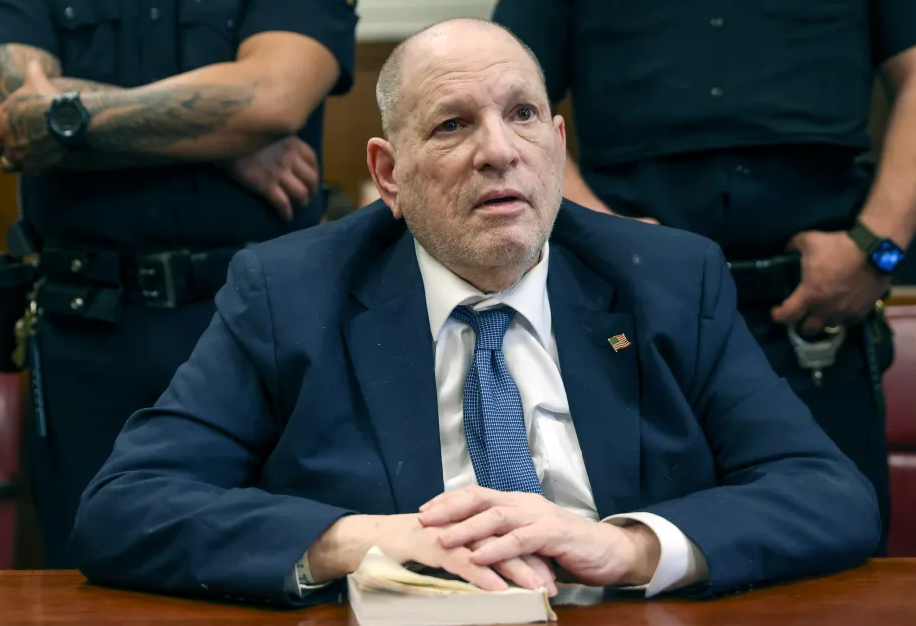After months of anticipation and controversy, the retrial of Harvey Weinstein—a disgraced Hollywood producer once at the heart of the #MeToo movement—has officially begun. This time, the court not only revisits familiar sexual assault charges but also faces a shocking new accusation: an alleged sexual assault committed against a teenage girl in 2002.
The prosecution has officially revealed the identity of Kaja Sokolova, a former Polish model, who has come forward with detailed allegations about her encounters with Weinstein in the early 2000s. According to the indictment, Weinstein allegedly forced her into a sexual relationship in 2006. More alarmingly, Sokolova also claims that four years earlier—when she was just 16—he touched her against her will and sexually assaulted her.
Sokolova, like two other accusers in this case, admits to fearing Weinstein at the time but tried to maintain a cordial relationship due to his immense power in the film industry and the career opportunities he seemed to offer.
In her opening statement, prosecutor Joan Illuzzi-Orbon asked the jury: “Why did this defendant have such control and influence over these three women? Because Harvey Weinstein defined the playing field. He knew how tempting the promise of success could be. He produced films, directed careers—and ultimately, orchestrated silence for years.”
Weinstein, now 73 and confined to a wheelchair due to health complications, avoided eye contact during the prosecutor’s statement but appeared to follow his defense team closely.
His attorney, Arthur Aidala, responded by attempting to reframe the narrative. Addressing a largely female jury, Aidala argued that the accusers were participants in a transactional dynamic within the entertainment industry—implying that their relationships with Weinstein were consensual exchanges rather than acts of coercion.
“Couch-casting [a term referring to sexual exploitation in casting] is not a crime scene,” he said, comparing the prosecution’s case to a “film trailer” for a movie destined to fail.
This retrial comes after New York’s highest court overturned Weinstein’s 2020 conviction last year, which had been seen as a landmark moment for the #MeToo movement. The court ruled that the original trial judge had improperly allowed testimony from witnesses not directly tied to the formal charges, thereby compromising the fairness of the trial.
The current proceedings are unfolding in a markedly different cultural environment. The #MeToo movement, which exploded in 2017 following the initial allegations against Weinstein, has since evolved and lost much of its initial momentum. Unlike the first trial, where protesters gathered outside shouting “predator,” there are no street demonstrations this time around.
Still, Sokolova’s lawyer, Lindsay Goldbram, sees significance in the case: “It sends a sign to other survivors—that the system is catching up, and speaking out matters, even when it feels hopeless.”
Although the jury won’t hear about the past convictions, they will hear Sokolova’s story in full detail. Following the state Supreme Court’s decision to send the case back to the lower court, prosecutors added a new charge based on Sokolova’s allegations.
According to prosecutors, Sokolova traveled alone to New York for work when she was 16 and met Weinstein. He initially invited her to lunch to discuss possible acting roles, but redirected the meeting to his apartment, telling her she would need to comply with his demands if she wanted a future in show business. She claims he then assaulted her and forced her into a sexual act without her consent.
Prosecutors say that after the assault, Weinstein gave Sokolova a small role in the film The Children’s Hour (2007), allowing her to meet stars and gain exposure. But despite this professional opportunity, he allegedly abused her again while she cried and begged him to stop.
Photos later circulated showing Sokolova, Weinstein, and others at an event, and The Weinstein Company sent her a letter recommending her to an acting school. Prosecutors noted that while this may seem strange to outsiders, unequal power dynamics often lead victims to react in unexpected ways.
After the widespread allegations surfaced in 2017, Sokolova also came forward publicly. Prosecutors claim she received $3.5 million in hush money.
Beyond Sokolova’s accusations, Weinstein is also facing two additional charges: one count of criminal sexual acts involving Miriam Haley, a production assistant in 2006, and another count of third-degree rape related to Ashley Matthau in 2013.
Additionally, Weinstein was previously convicted in Los Angeles for sexual assault, though he has appealed that verdict as well, citing similar concerns about the use of testimonies from women who did not file formal complaints.
Legal experts note that all cases are shaped by their social and political context. Weinstein’s legal team hopes that five years after his initial trial—and nearly eight years since the #MeToo movement began following Ronan Farrow’s explosive reporting in The New Yorker—American public opinion may have shifted.
Indeed, Weinstein has made explicit efforts to court conservative support. Recently, he stated: “I want to sincerely thank Candace Owens for her support and for amplifying my voice to millions, and Joe Rogan for further reinforcing it.”
As the trial unfolds, the courtroom will serve not only as a venue for justice but also as a mirror reflecting the evolving sensibilities of a society still grappling with issues of power, accountability, and gender justice.
Fars News Agency


